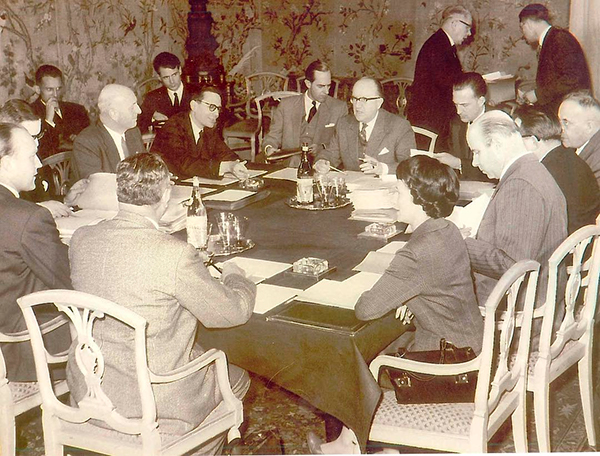
On 25 March, after a prior meeting this weekend of the European Council devoted essentially to economic growth and employment, the 27 members (the UK, on the verge of triggering the Brexit process, will not attend) are set to hold a special summit in the Italian capital to commemorate the 60th anniversary of the Treaty of Rome. After the European Coal and Steel Community in 1950, and in the wake of a crisis, namely the failure of the European Defence Community, the Treaty of Rome got the European Communities underway, then with six members, today as the EU with 28, for now. The 27 have much to celebrate: they introduced a new political model into the world, a new system of integration founded on peace and freewill. On 7 February the Treaty of Maastricht –which incompletely sketched out the Economic and Monetary Union– had its 25th anniversary. But despite the predictably lofty sentiments, the members travelling to Rome will be divided amongst themselves and internally within their societies, rudderless, or, as we say in Spain, like a cow without its bell.
Responsibility for reattaching the bell falls to a leader or group of leaders –all of whom are either lacking or immersed in elections– or at least the European Commission, the ‘guardian of the treaties’. In the current circumstances all the Commission has been able to come up with, in a new White Paper on the future of Europe on the eve of the Rome summit, is to suggest five possible paths forward, not mutually exclusive, five scenarios depicting how the EU could evolve between now and 2025, minus the Brits: (1) continuing as before, plugging away; (2) focusing solely on the single market; (3) making headway amongst those who wish to do more together, with various speeds and groupings; (4) doing less, but more efficiently; and (5) doing much more together. The current French and German governments seem to be leaning towards the third option amid ‘the various levels of ambition’ they detect in the EU, something that the Commission’s President, Jean-Claude Juncker, also backs.
These scenarios have the merit of rawness and go as far as explicitly mooting the possibility of going backwards, to a de-integration of the EU. But they are devoid of any soul or emotion, or even a sense of common identity. Whether one or another path is pursued, or various simultaneously, will depend to a large extent on the results of the elections being held in the Netherlands, France, Germany and elsewhere. As things stand, the famous shared values are being challenged with attacks on democracy and the rule of law in various countries, such as Hungary and Poland, or with certain attitudes to refugees and immigrants.
The European Parliament, albeit in a virtually empty chamber, debated the White Paper, its general praise being tempered by criticisms of the Commission for not choosing from among the five paths or providing examples of them. The Parliament has been more specific in its proposals. In three resolutions it approved in the run-up to the Rome summit, which have largely gone unnoticed, it advocated among other things making the most of the existing Lisbon Treaty while turning the Council of Ministers into a genuine second legislative chamber; that each member state should present at least three candidates, including both sexes, to be eligible for consideration by the President-elect for posts in his or her considerably reduced Commission; promoting the idea of a minimum wage determined by each member state; and studying the possibilities of a system of minimum unemployment benefit. Beyond this it proposes an ambitious reform of the treaties in the areas of economic governance, foreign policy, fundamental rights and transparency, creating the role of an EU Finance Minister and a common economic policy, based on a genuine budget designed for the Eurozone –financed by its members–, which would be bolstered by a strategy, a code of convergence for the economies in the single currency and a European Monetary Fund.
Ruling out for the moment the path of ‘more Europe, in all directions’, the option that makes most sense, and that has been prioritised by the EU for some time, is that of advancing (and indeed retreating or, in other words, renationalising in some areas) more among those who want to and can, whether in defence, technology or other fields. As Thorsten Beck and Geoffrey Underhill argue in an interesting jointly-authored book, the policy of muddling through is no longer enough, and hence what is now needed is to take more daring steps, radically re-thinking both structures and goals, with policies that meet the problems of citizens and states. Acknowledging the poor management of the economic crisis by the EU, the Commission has admitted in its White Paper that ‘addressing the legacy of the crisis, from long-term unemployment to high levels of public and private debt… remains an urgent priority’. It was not before time.
But it is necessary to go further in terms of identity, collective identity. In the absence of a European identity, we have to reconstruct the project from the bottom up, or, in other words, from the basis of the citizens and the states: a European Republic. And inspire hope. So the EU has to go back to being an inspiring project of a shared task, to paraphrase Ortega y Gasset’s definition of a nation, or it will cease to exist, or at the least it will be restricted to limping dispiritedly like a lost soul in a post-Western world.
Not much is to be expected from this 60th anniversary. Whatever is due to unfold will come eventually. Despite Trump and despite Putin. We depend on ourselves. Rather like Baron Munchausen, we all have to pull ourselves up by our own hair to extricate ourselves from a mire of our own making.


